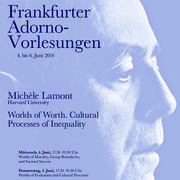
On June 4 to 6, 2014, Michèle Lamont delivered the Adorno Lectures on the topic of Worlds of Worth: Cultural Processes of Inequality, at the Institut für Sozialforschung at the Johannes Wolfgang Goethe Universität in Frankfurt am Main, Germany. She will be conférencière invitée sur chaire d’Etat at the Collège de France in May 2015, where she will deliver these same lectures over four weeks. These lectures (in preparation for publication in German, French and English) offer an overview of her far-reaching research agenda. More specifically:
Lecture 1 is titled “Worlds of Morality, Group Boundaries and Societal Success.” It explores the relationship between symbolic, social, and particularly moral boundaries in the making of inequality. Lamont defines symbolic boundaries (or the distinctions we make between types of people) as necessary conditions for the creation of social boundaries, which manifest themselves in patterns of intermarriage, residential segregation, and other forms of networks that are associated with unequal access to resources. Drawing on earlier work, she discusses the role played by moral distinction in the making of groups, and by extension in social inclusion and recognition. She describes recent changes in the drawing of group boundaries in the context of neo-liberalism and argues that the existence of plurarchies or heterarchies is a hallmark of societal well-being. She also presents an approach to societal well-being, captured by the notion of “successful societies,” which emerged from the collaborative work of an interdisciplinary group of social scientists, which Lamont co-directed (with Peter A. Hall) and which met for twelve years to study this very question. Their collective work offers tools for thinking about how to meet some of the challenges that come with neo-liberalism.
Lecture 2 is titled “Worlds of Evaluation as a Cultural? Process.” Here Lamont makes the case that a sociology of valuation and evaluation forges new paths in our understanding of the production of inequality. First, she summarizes main conclusions of her book How Professors Think: Inside the Curious World of Academic Judgment, which concerns US-based evaluations of academic excellence. This book tackles questions such as the formation of the evaluative self, the necessary role of emotion and interaction in evaluation, and disciplinary differences in the intersubjective construction of merit and worth. Second, Lamont go beyond the US case to examine how practices of scholarly evaluation are shaped by the geographic and political contexts in which national higher education systems evolve, discussing cases drawn from China, France, Spain and the Nordic countries. Third, she extends this analysis to a broader sociology of evaluation and valuation that concerns the production and diffusion of worth and value through a focus on evaluative practices and technologies. She discusses how evaluation, considered in conjunction with other social processes such as standardization, identification, and racialization, can help us capture how cultural processes contribute to the reproduction of inequality. She locates her efforts in the context of a booming literature on evaluation now coming out of Europe and the United States.
Lecture 3 focuses on “World of Stigmatization and the Micro Production of Social Inclusion.” Turning her focus to a topic of burning urgency, this lecture concerns how environments enable and constrain different experiences and responses to stigmatization and discrimination, including different ways for marked groups to demonstrate their equal worth. Lamont presents results from a large collaborative study of how African-Americans, Black Brazilians, and stigmatized groups in Israel (Ethiopian and Mizrahi Jews and Arab Palestinians) respond to exclusion. She argues that the cultural repertoires available in the three national contexts, the relative groupness of each population under consideration, and other aspects of contextual configurations color how each group experiences stigmatization and discrimination and how they actually respond or believe it is best to respond. Examining responses to exclusion constitutes a useful angle for exploring the world of worth: such responses are implicitly predicated on different views regarding what makes people equal, how to establish equality, and how to claim dignity and recognition. It is a form of everyday anti-racism that offers a useful complement to our two other worlds of worth: those of morality and plurarchy and of evaluation and valuation.
Lecture 4 is titled “Worlds of Worth Compared.” Here, Lamont provides a reflection on the study of worth across domains of social life, new directions for the cultural sociology of inequality, the need to connect philosophical, ethical, and sociological inquiry, and the main theoretical and political challenges ahead. She also discuss the practical relevance of her research for the promotion of “Cultures of Health” in line with a new research program she is developing in collaboration with the Robert Wood Johnson Foundation, building on the contributions of the Successful Societies research program.
Michèle Lamont is Robert A. Goldman Professor of Sociology and Professor of African and African-American Studies. She will assume the directorship of the Weatherhead Center for International Studies in July 2015.